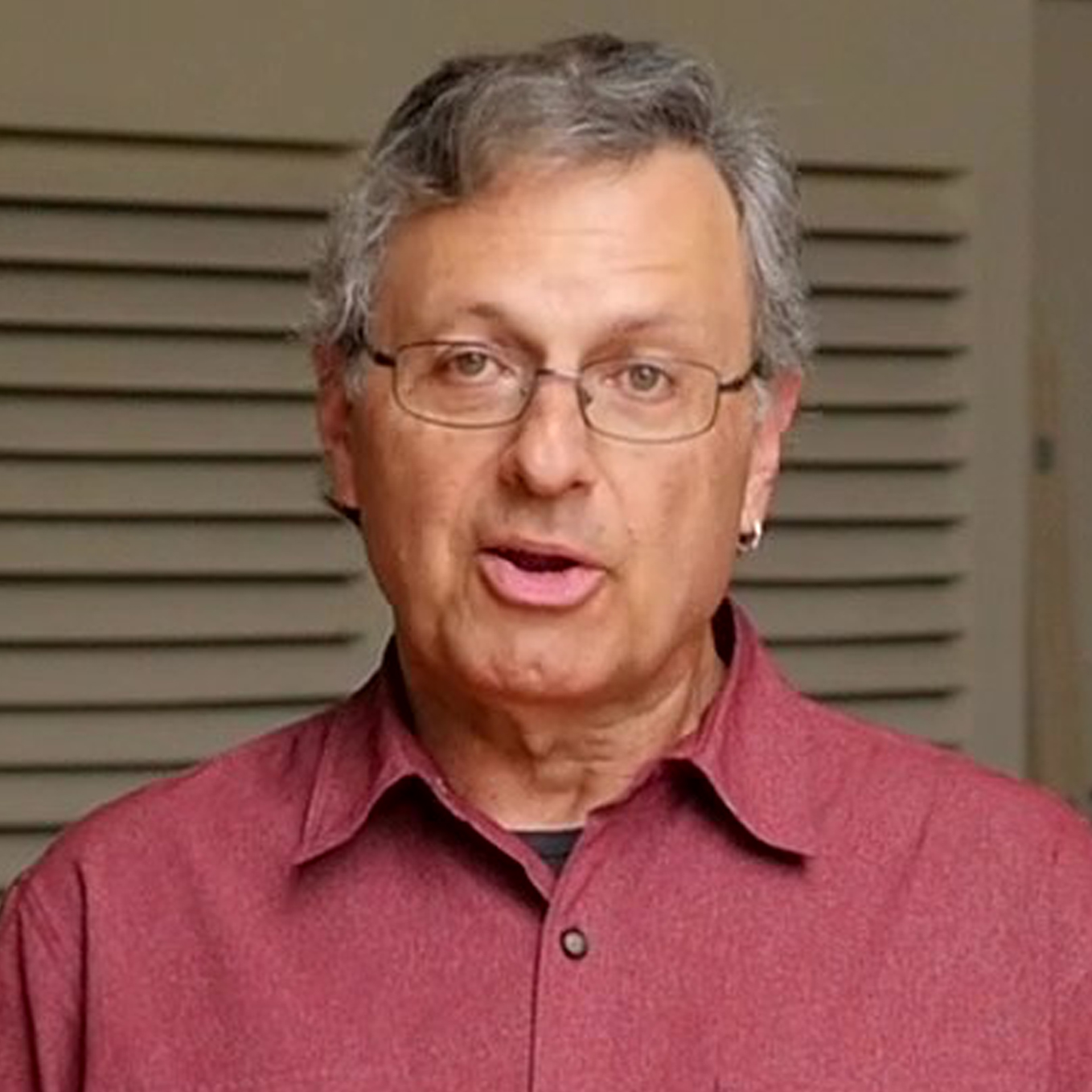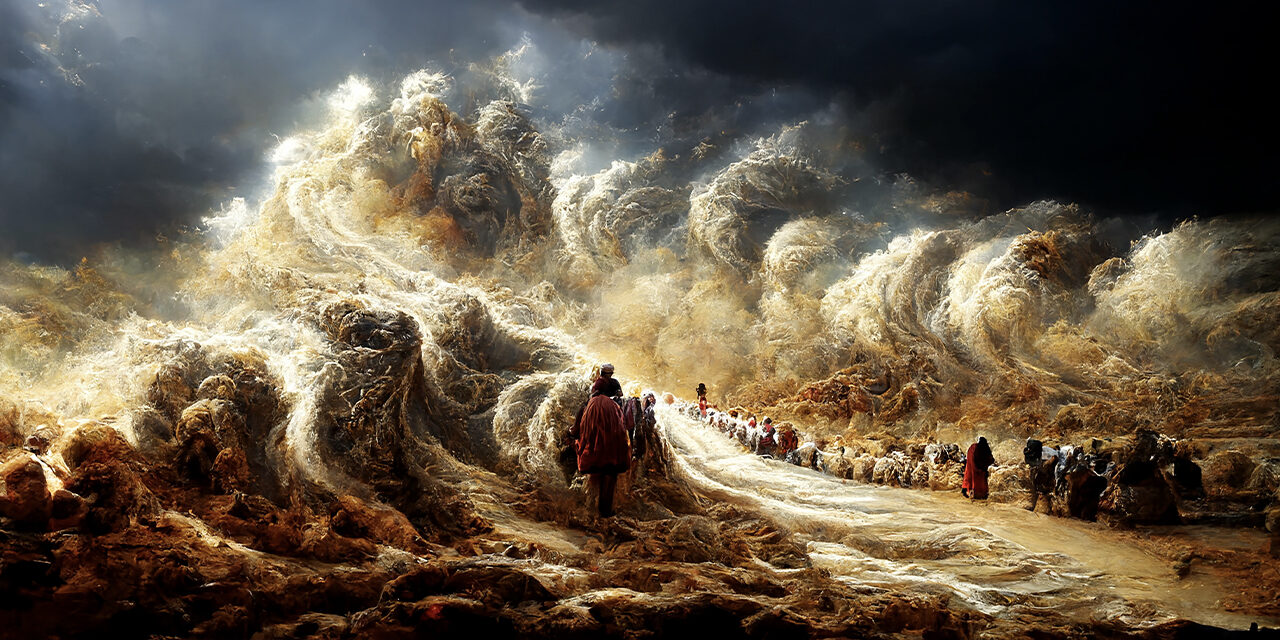
J. Richard Middleton
J. Richard Middleton, Ph.D., is the professor of biblical worldview and exegesis for Northeastern Seminary at Roberts Wesleyan University. His books include “Abraham’s Silence: The Binding of Isaac, the Suffering of Job, and How to Talk Back to God,” “A New Heaven and a New Earth: Reclaiming Biblical Eschatology” and “The Liberating Image: The Imago Dei in Genesis 1.” He previously served as the president of the Canadian-American Theological Association.
By J. Richard Middleton
This article is the second installment of a two-part series. Click here for the first article, “Memory Raises Troubling Questions: Nighttime Distress in Psalm 77:1–10.”
“Your way was through the sea, your path through the mighty waters.” (Psalm 77:19)
In part 1 of this article, we followed the psalmist in his desperate lament to God, rooted in what he sensed was a change in God’s favor toward him. He started out raising his voice to God, crying out, seeking God’s attention (v. 1–3). When he found no comfort, he decided to reflect on the times when things went well, when God seemed to favor him. But the contrast between then and now only magnified the problem and made his pain more evident (v. 4–10).
III. Remembering God’s Mighty Deeds — The Sea Crossing (11–20)
Then comes the most significant transition in the psalm, signaled once more by the key verbs for remembering and meditating, which the psalmist has used twice before (v. 3 and 6). In fact, the verb for remembering occurs twice in verse 11, first as a statement of fact, then as a passionate statement of intent. “I will remember the deeds of the Lord; Indeed, I shall remember His wonders of old!” (v. 11). The next verse uses the verb for meditate. “I will muse on all Your work, and on Your mighty acts I shall meditate!” (v. 12)
_
“He hasn’t allowed his despair to turn him away from God.”
_
Notice the use of “Your” in verse 12. The only time before verse 12 that the psalmist has spoken directly to God was in verse 4. But from here on, the rest of the psalm is a prayer, addressed to the very One he felt had abandoned him. Clearly, the psalmist hasn’t given up on God. He hasn’t allowed his despair to turn him away from God.
His prior reflections about God (v. 3) and his memories of the good old days (v. 5) didn’t help; they plunged him further into despair. Will it be different this time? What will make the difference?
Instead of thinking back on his own personal story, the psalmist decides to call to mind God’s “deeds,” “wonders,” “work,” and “mighty acts” (v. 11–12). His focus will be not on his own experience of God, but on the communal story of God’s redemption of Israel. Indeed, when he says, “I will remember the deeds of the Lord,” the Hebrew for “Lord” is Yah, the short form of the divine name, Yahweh. This form is used in the song that Moses and Miriam sang at the crossing of the Red Sea: “The Lord [Yah] is my strength and my might, and He has become my salvation” (Exodus 15:2).
Then the psalmist goes on to ask, “Who is a God as great as our God?” (v. 13) “You are the God who does wonders” (v. 14), using the same word for “wonders” from verse 11. His focus is the incomparability of Israel’s God, who is “holy”/unique/set apart (v. 13) and who manifested His strength among the nations (v. 14). Here the psalmist clearly echoes the incomparability of Yahweh celebrated in the Song at the Sea: “Who is like you, O Lord, among the gods? Who is like you, majestic in holiness, awesome in splendor, doing wonders?” (Exodus 15:11)
And the purpose of this manifestation of God’s holy power, both in Exodus 15 and in our psalm, is the salvation of Israel: “In your steadfast love you led the people whom you redeemed; you guided them by your strength to your holy abode” (Exodus 15:13). “With your arm you redeemed your people, the children of Jacob and Joseph” (Psalm 77:15).
Psalm 77 then describes a vivid theophany, a dazzling poetic account of how God manifested His glory and power at the Red Sea (v. 16–18). In its poetic imagery, Psalm 77 goes well beyond the Song of the Sea (Exodus 15:1–18). There the waters functioned as God’s instrument of judgment against Pharaoh and his army (just as in the plague story, God used the forces of nature to judge Egypt). In the psalmist’s version of the sea crossing, he has the waters themselves writhing and trembling as if they are scared of God (v. 16). He even describes a violent storm with booms of thunder, flashes of lightning, and a whirlwind (v. 17–18); indeed, the earth shakes at God’s coming to save His people (v. 18).
This sort of poetic license in describing the Sea crossing echoes imagery found also in Psalm 114, Psalm 18:1–19, and Habakkuk 3. In these theophanies, God’s coming to save His people is portrayed in terms of rescuing them out of the waters of chaos, which are engulfing them.
_
“Forgetfulness of the mighty acts of God in Scripture leads to losing our way in life.”
_
Why does the psalmist remember the sea crossing in this way? He is likely experiencing his own life as being submerged in an experience of chaos where he can’t find a way out. So he focuses not on God’s defeat of Pharaoh, but on God making a path through what seemed like an impenetrable dead end for Israel.
Here is where we can learn from the psalmist, especially if we find ourselves in a similar situation. Instead of focusing on times when things were going well for us, which can lead us to further negativity as we wonder why things have taken a turn for the worse, we can call to mind, instead, the big picture — the biblical story of God’s salvation of Israel at the Red Sea or (beyond that) the path through death to new life forged by Messiah Jesus in His life, atoning death, and resurrection. The key point is that the meaning of our lives is determined by the larger story that we indwell. Forgetfulness of the mighty acts of God in Scripture leads to losing our way in life. But remembering — calling the story of salvation to mind and meditating on what God has done — can be transformative and life-giving.
I take verse 19 as the key verse of Psalm 77: “Your way was through the sea, Your path through the mighty waters.” The way for Israel was blocked; yet no matter how impenetrable the chaos seemed, God made a way. But that’s not quite the end of the verse. The third line adds, “yet Your footprints were not known.” Even at the Red Sea, God’s leading was mysterious; no one saw God directly. And this fits the psalmist’s experience as well; he can’t see where God can be found in his life.
Yet even if Israel couldn’t see God’s footprints at the Red Sea, “You led your people like a flock by the hand of Moses and Aaron” (v. 20). These are the last words of the psalm.
An Unfinished Ending
When I reached this verse, I have to admit I was a bit taken aback. It seemed like an abrupt ending. OK, God led His people through the Red Sea. But did this memory impact the psalmist in any way? He doesn’t tell us.
I think that the psalmist was hoping that God would take him by the hand and lead him through his darkness and chaos to the other side. But he doesn’t tell us this in so many words. He doesn’t connect the big story to his own experience.
The psalm felt (and still feels) unfinished to me. This isn’t just a matter of my perception. At the formal level of Hebrew poetry, the psalm is incomplete.
Most of Psalm 77 up to verse 15 (with one exception) consists in paired lines (two lines that form a thought). We call each pair of two lines a bicolon; it is typical of Hebrew poetry. But starting with verse 16, we have tricola — a series of three linked lines (this is also found in Hebrew poetry but is less common). You can see the three-line structure of each verse in 16–19 in almost any Bible translation.
But the last verse is different; there are only two lines in verse 20. Where is the third line?
I have come to think that Psalm 77 is intentionally unfinished so that we, the readers, can write our own conclusion, applying this magnificent vision of God making a way for ancient Israel to our own life situations.
_
“We need to slow down and take the time to indwell Scripture and savor its meaning.”
_
But this requires really remembering the story and meditating on its significance. In our age of fast-paced activity, we need to slow down and take the time to indwell Scripture and savor its meaning. We often do a quick drive-by, admiring the biblical landscape from a distance. But do we get out of the car and walk slowly through the text, on pilgrimage through its amazing pathways?
I personally have memorized Psalm 77 (in both English and Hebrew), praying it as my own cry to God and consciously envisioning the psalmist’s description of God’s coming to save and to guide. And it has led me to think about how I would conclude this open-ended psalm. My conclusion would be something like: “Perhaps You might lead even me to dry ground.”
If you could write a last line to this psalm, linking the story of God’s deliverance that the psalmist tells to your own life, what would you write?
Psalm 77
(Literal translation and outline by J. Richard Middleton)
For the leader; upon Jeduthun; for Asaph; a psalm.
I. REMEMBERING GOD IN A TIME OF DISTRESS (1–3)
Recounting a Cry to God and Inner Distress (1–2)
1 My voice to God, I shall cry out!
my voice to God, that He may listen to me!
2 In the day of my distress I sought the Lord;
my hand at night has been stretched out without wearying;
my soul refused to be comforted.
A Commitment to Remembering God (3)
3 I shall remember God, and I shall complain;
I shall meditate, though my spirit faints. Selah.
II. REMEMBERING THE PAST — THE GOOD OLD DAYS (4–10)
Physiological Symptoms of Distress (4)
4 You grasped my eyelids;
I was troubled and could not speak.
A Commitment to Remember the Past (5–6)
5 I considered the former days,
years of long ago.
6 I shall remember my song in the night;
with my heart I shall meditate and my spirit will search:
Memory Raises Troubling Questions (7–9)
7 “Will the Lord reject forever,
and no longer show favor?
8 Has His steadfast love ceased forever?
Is His word permanently ended?
9 Has God forgotten to be gracious?
Has He in anger stifled His compassion?” Selah.
The Core Issue (10)
10 And I say, “This is my pain:
The right hand of the Most High has changed.”
III. REMEMBERING GOD’S MIGHTY DEEDS — THE SEA CROSSING (11–20)
Intentional Remembering of What God Has Done in the Past (11–12)
11 I will remember the deeds of the Lord;
(indeed, I shall remember Your wonders of old.
12 I will muse on all Your work,
and on your mighty acts I shall meditate.
Focus on God’s Distinctive Character at the Sea (13–15)
13 Your way, O God, is holy.
Who is a God as great as our God?
14 You are the God who does wonders;
You made known Your strength among the peoples.
15 With Your arm You redeemed your people,
the children of Jacob and Joseph. Selah.
The Waters’ Response at the Coming of God to Save Israel (16–18)
16 The waters saw You, O God,
the waters saw You, they writhed;
indeed, the deeps quaked.
17 The dark clouds poured out water;
the clouds gave voice;
indeed, Your arrows traveled.
18 The voice of Your thunder was in the whirlwind;
lightnings lit up the world;
the earth quaked and trembled.
God Led Israel Through the Waters of Chaos (19–20)
19 Your way was through the sea,
Your path through the mighty waters;
yet Your footprints were not known.
20 You led your people like a flock
by the hand of Moses and Aaron.+

J. Richard Middleton
J. Richard Middleton, Ph.D., is the professor of biblical worldview and exegesis for Northeastern Seminary at Roberts Wesleyan University. His books include “Abraham’s Silence: The Binding of Isaac, the Suffering of Job, and How to Talk Back to God,” “A New Heaven and a New Earth: Reclaiming Biblical Eschatology” and “The Liberating Image: The Imago Dei in Genesis 1.” He previously served as the president of the Canadian-American Theological Association.









